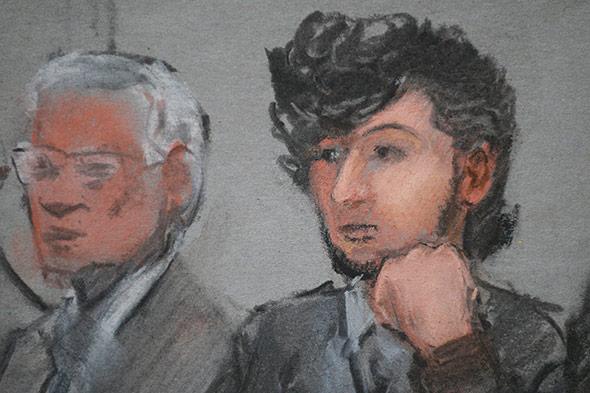The jurors in the Dzhokhar Tsarnaev trial sped through the questions that decided his fate at the rate of three or more an hour—about enough time to read the question out, take a vote, count the hands, and move on to the next question. Most important, though, the jury appeared to agree unanimously that the 19 mitigating factors proposed by the defense made no difference. If even one juror had found it impossible for any reason to vote for the death penalty, Tsarnaev would have been sentenced to life imprisonment for his role in the Boston Marathon bombing.
There is a common misconception that, in certain cases, the law requires the death penalty. This is never the case—it is always up to the jury. And yet this jury seems to have all but rubber-stamped the verdict. This suggests that the defense failed in its most basic effort, to get the jury to see Tsarnaev as a human being. The prosecution succeeded in convincing the jurors that he wasn’t one.
The most important words spoken by Assistant U.S. Attorney William Weinreb in his closing were, “These were political crimes, designed to punish the United States … by killing and mutilating innocent civilians on U.S. soil.” Throughout the trial, prosecutors talked about the Tsarnaevs “attacking us” or “attacking the U.S.” They used the language of war—and in a war, the enemy is dehumanized by definition, rendered at once more powerful than a human being and less than human.
The defense was sensitive to this tactic and helpless to resist it. Out of earshot of the jury, attorney David Bruck complained to the judge that he could not object to references to the wars in Iraq and Afghanistan because it would only further alienate the jury from his Muslim immigrant defendant. In the end, the prosecution’s ability to frame the defendant as an enemy combatant may have been the key difference between the Tsarnaev case and those in which defense attorney Judy Clarke was able to save the lives of horrible people: They had all committed heinous crimes, but they appeared to be people killing other people, not terrorists attacking the United States.
During the jury selection process, the defense seemed particularly wary of two kinds of people: those who were eager to serve on the jury, and those who appeared to have leadership qualities. The eager types were dangerous because they might harbor a hidden agenda, be it to write a book or to make sure Tsarnaev got the death penalty. A strong leader was undesirable because he or she might unite the jury and minimize the probability of a single juror dissenting.
One potential juror seemed undesirable on both of these counts: She very much wanted to serve, and she worked as a restaurant manager, which spoke to her leadership skills. When Bruck questioned her enthusiasm, she explained that she considered jury duty to be a uniquely American duty and honor. Only in this country, she said, could someone like her—a woman who had never gone to college and had worked as a waitress for 24 years—be trusted with something so important. When Bruck asked if she would be able to stop being a manager for a few months and work alongside other jurors as equals, she assured him that she did not like the responsibilities of management. She dealt with them, however, by keeping a certain perspective. When she had to fire an employee, she explained, she told herself it was not her decision but the employee’s: “They decided not to come to work, or they decided to steal.” This was a readymade recipe for rejecting responsibility—including the personal responsibility for sentencing a man to death.
In other respects, though, the restaurant manager seemed like an ideal juror: She had no strong views either on Tsarnaev’s guilt or on the death penalty in general. She was seated by the court, and was eventually chosen as the foreperson. So the jury went into deliberations armed with two narratives to speed their final decision: the prosecution’s story that Tsarnaev was an enemy combatant and the restaurant manager’s story that everyone seals his own fate.
Read more of Slate’s coverage of the Dzhokhar Tsarnaev trial.
